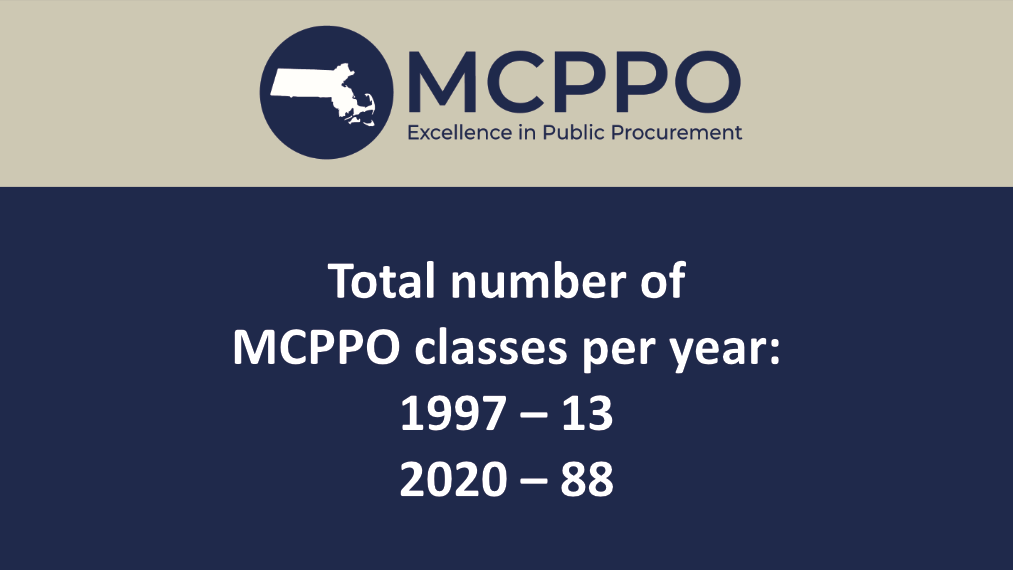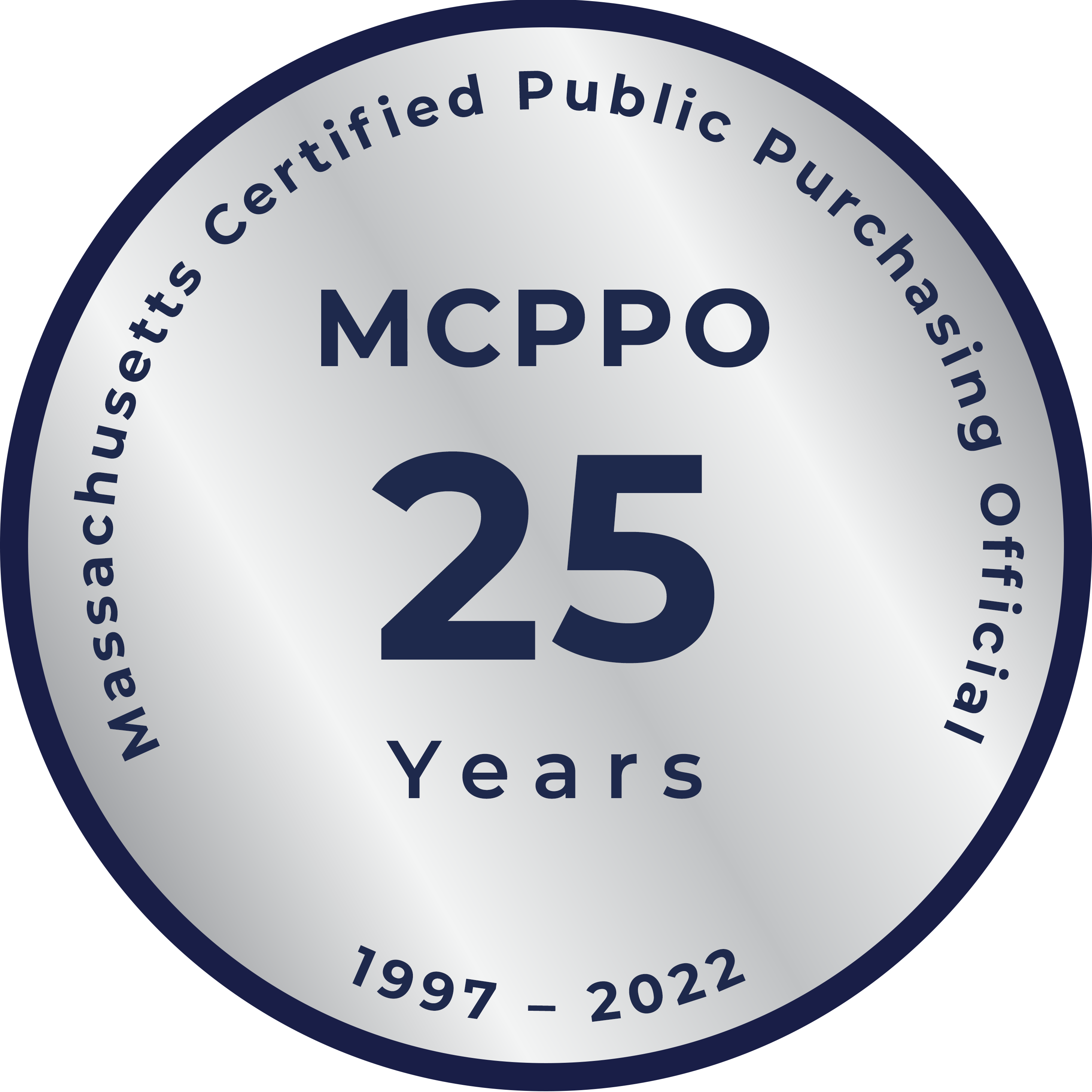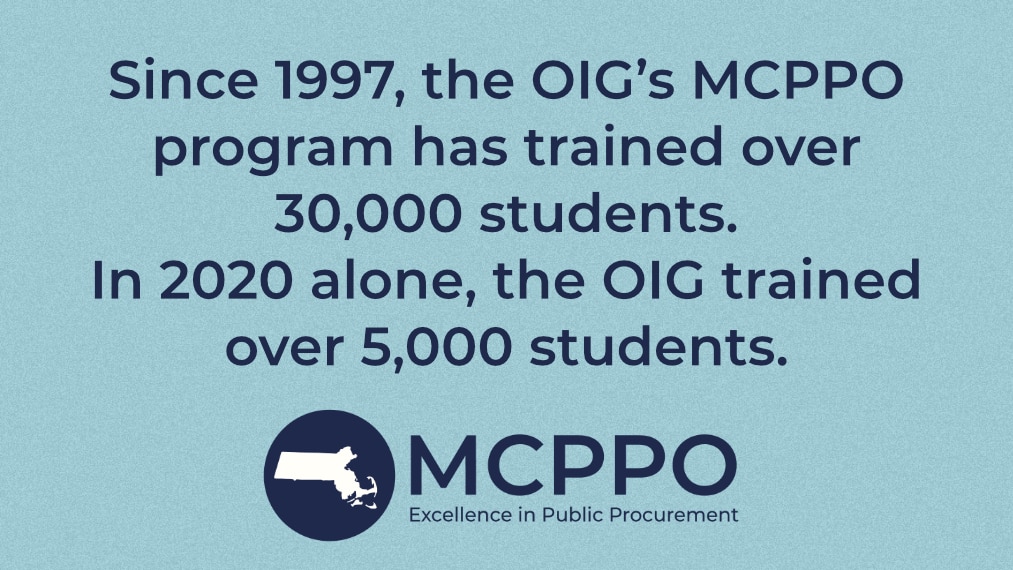The History of the MCPPO Program
As part of its mission to prevent fraud, waste and abuse of public resources, the Office of the Inspector General (OIG) has long engaged in educational outreach. In 1990, the Office published the Chapter 30B Manual to educate local officials about the newly-enacted Uniform Procurement Act, Chapter 30B of the Massachusetts General Laws, which governs the acquisition and disposition of supplies, services and real property by local jurisdictions. The OIG also began sending employees across the state to teach city and town purchasing officials and other staff about the requirements of Chapter 30B.
These outreach efforts were so effective that in 1996, the OIG received legislative authorization to create a public purchasing official certification program. See 1996 Mass. Acts. c. 151, § 2, 0910-0210. Based on that authorization, the OIG established the Massachusetts Certified Public Purchasing Official (MCPPO) program, a comprehensive educational program for public purchasing officials and individuals in the private sector who conduct business with public entities. The MCPPO program would support the Office’s mandate by teaching public employees how to comply with Chapter 30B and thus help prevent fraud, waste and abuse of public funds and property in their jurisdictions. The OIG also believed that a certification program that allowed students to earn credentials would bring professionalism and expertise to the field of public purchasing.
The Office convened an advisory group, including representatives from the Massachusetts Association of Public Purchasing Officials, the Massachusetts Association of School Business Officials, and the City Solicitors and Town Counsel Association, to assist with the development of the MCPPO program and its training curriculum. Based on feedback from the advisory group, the OIG designed the MCPPO program to include foundational core classes as well as seminars on more specialized or advanced topics. After successfully completing the requisite core classes and documenting their work and educational experience, students could apply for an MCPPO designation.
In January 1997, the Office offered its inaugural MCPPO General Certification Seminar at the McCormack Building in Boston. By the end of the year, over 300 participants had attended. The following year, the General Certification Seminar became Public Contracting Overview, which continues to be a foundational MCPPO class today. The MCPPO program also added the Supplies and Services Seminar (now Supplies and Services Contracting) and a seminar on designing and constructing public facilities that would later become the Design and Construction Contracting class. In 1999, two years after launching the MCPPO training seminar series, the Office awarded the first 200 MCPPO designations.
As the demand for training increased, the Office added new classes, including Advanced Topics Update, Construction Management at-Risk, Real Property and Creating a Procurement Office in the 2000s. Office staff also began speaking at outside engagements for government agencies, public universities and professional associations. In addition, the Office created two new classes to help individuals meet certain legal requirements. In 2007, in response to new Massachusetts School Building Authority (MSBA) regulations, the Office began offering Certification for School Project Designers and Owner’s Project Managers (OPMs). School Project Designers and OPMs must take this class before they can work on school building projects funded by the MSBA. See 963 CMR 2.12(6), 2.11(12). In 2008, the MCPPO introduced Charter School Procurement to help charter school administrators satisfy the Legislature’s requirement that they earn an MCPPO certificate. See 1997 Mass. Acts. c. 46.
For many individuals, however, traveling to Boston for MCPPO classes was challenging. In 2010, the Office started videoconferencing and webcasting classes in the town of Huntington to increase access for students in the western part of the state. By 2014, MCPPO instructors also connected with students via videoconference in Barre, Bourne, Centerville, Fall River, Greenfield, Lowell, Pittsfield and Haverhill. In 2017, MCPPO instructors began traveling to communities across the Commonwealth to hold in-person classes, teaching in Amherst, Barnstable, Framingham, Methuen, North Attleboro, Shrewsbury, Westfield and other locations. In 2020, in a further effort to increase remote access to MCPPO training, the Office introduced its first self-paced, web-based classes with the release of online versions of Supplies and Services Contracting and Real Property Transactions.
By the end of 2019, more than 25,000 people had participated in MCPPO trainings, and the Office had awarded MCPPO designations to more than 2,000 people during the program’s existence. In 2019 alone, more than 2,300 people attended at least one of the 96 MCPPO classes and outside speaking engagements the Office presented. Then the COVID-19 pandemic hit.

Rather than derailing the MCPPO program, the pandemic provided the Office with an opportunity to provide even greater access to training. Because students and instructors could not meet in-person, the MCPPO program transitioned nearly its entire catalog of trainings from in-person and videoconferencing classes to a fully online program. Students could now attend MCPPO classes from any location via live webinars. To continue to meet MCPPO students’ changing training needs, schedules and budgets, the Office expanded its offerings further and added a series of 60- to 90-minute webinars on relevant topics, including topics related to the pandemic. By taking these steps, the Office continued to reach the widest audience possible while following COVID-19 health guidelines.

The success of the MCPPO program’s transition during the pandemic is evident in the response of the program’s students. In 2020, the Office provided training to 5,046 participants, almost 2,800 more than the year before the pandemic. Many students expressed their appreciation for the opportunity to participate in remote classes. Students often said that they saved time and money because they did not have to travel to Boston to attend a training. Some students, however, reported that they missed seeing their colleagues and networking in-person. To that end, the MCPPO program plans to offer both remote and in-person classes when it is safe to meet indoors in large groups again. Students who enjoy the convenience of participating remotely will be able to do so while others who prefer the in-person learning experience will be able to attend a class in the MCPPO classroom in Boston or at another venue in Massachusetts.

Since 1997, the Office has continuously expanded and adapted the MCPPO program to better educate its students about statutory compliance and best practices in public procurement. Participants have learned how to avoid favoritism and ensure equal opportunity for all qualified vendors to participate in open and fair competition for contracts with public entities in Massachusetts. Next year, the MCPPO program will celebrate its 25th anniversary. The program will continue to serve the people of the Commonwealth by promoting compliance with public procurement laws and providing students with the tools they need to prevent and detect fraud, waste and abuse of public resources.
Additional Resources
Contact for OIG Bulletin, October 2021: The MCPPO Program - Past, Present and Future
| Date published: | October 25, 2021 |
|---|